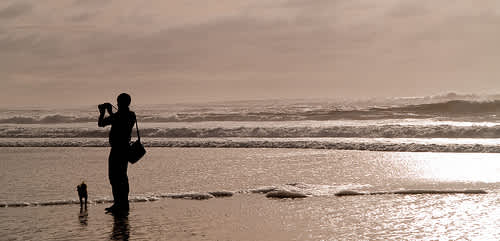EPA to Provide Nearly $10 Million to Clean Up Beaches Across the Nation
OutdoorHub Reporters 01.31.12

With foresight long before the summer swimming season opens up across the United States, the Environmental Protection Agency announced grants aimed at improving beach quality and a website that warns residents of beach closures.
In an email message, EPA Representative Enesta Jones said each swimming season local and state authorities monitor water quality along the nation’s coastal and Great Lakes beaches. “When bacteria levels in the water are too high, these agencies notify the public by posting beach warnings or closing the beach,” Jones said.
The grants awarded by the EPA allow for more widespread closure notice through an online database of closures, titled BEACON, developed by the EPA. The same year that Congress passed the Beaches Environmental Assessment and Coast Health (BEACH) Act, they began offering grants meant to improve water quality and testing at beaches for the benefit of the public. Dually, the grants help beach managers to inform the public of any water quality problems there may be via BEACON or their own means.
“The BEACH Act amends Section 406 of the Clean Water Act to authorize EPA to award grants to eligible states, territories and tribes to develop and implement beach water quality monitoring and notification programs for coastal and Great Lakes recreational beach waters,” said Jones.
With the grants and with the website BEACON, the government hopes to aid beach managers in quickly alerting the public of a beach closure should pollution or poor water quality unsuitable for swimming be detected.
Original press release issued by the Environmental Protection Agency on January 31st, 2012:
The U.S. Environmental Protection Agency (EPA) today announced that it will provide $9.8 million in grants to 38 states, territories and tribes to help protect the health of swimmers at America’s beaches. The agency also launched an improved website for beach advisories and closings, which will allow the public to more quickly and easily access the most current water quality and pollution testing information for more than 6,000 U.S. beaches.
The website, called BEACON, has the capability to update as frequently as every two hours based on new data provided by states, territories and tribes. Users will have access to mapped location data for beaches and water monitoring stations, monitoring results for various pollutants such as bacteria and algae, and data on public notification of beach water quality advisories and closures. For the first time, users can also access reports that combine notifications and water quality monitoring data. The enhanced system also uses enhanced map navigation and report display tools.
The majority of beach advisories and closures in the United States are due to water test results indicating bacterial contamination, which can make people sick. Bacterial contamination comes from a variety of sources. Some examples are sewer overflows, untreated stormwater runoff, boating wastes, wildlife and pet waste, and malfunctioning septic systems.
During each swimming season, state and local health and environmental protection agencies monitor the quality of water at the nation’s beaches. When bacteria levels in the water are too high, these agencies notify the public by posting beach warnings or closing the beach.
The grants will help local authorities monitor beach water quality and notify the public of conditions that may be unsafe for swimming.
This is the 12th year that EPA is providing beach grant funds, bringing the total amount EPA has made available to nearly $111 million. As a result, the number of monitored beaches has more than tripled to more than 3,600 in 2010. Grant applications must be received within 60 days of publication of EPA’s notice in the Federal Register. EPA expects to award the grants later this year.
View EPA’s enhanced beach advisory and closing information: www.watersgeo.epa.gov/BEACON2
More information on the grants: www.water.epa.gov/grants_funding/beachgrants/index.cfm

